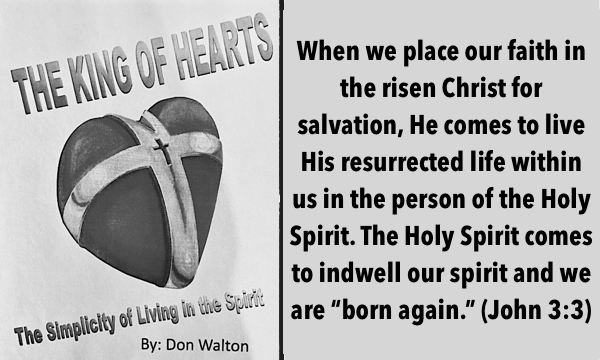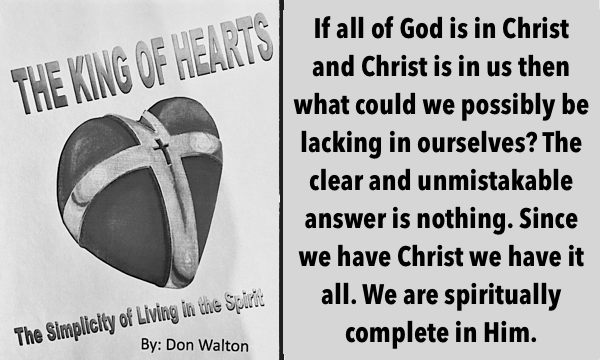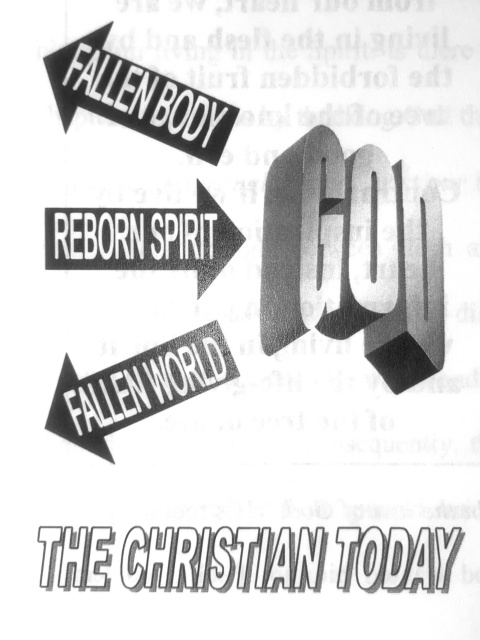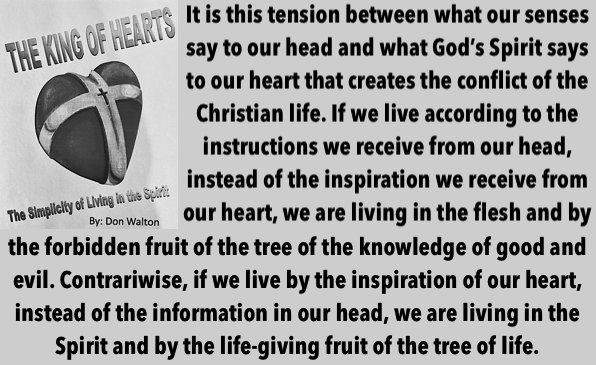 When we place our faith in the risen Christ for salvation, He comes to live His resurrected life within us in the person of the Holy Spirit. The Holy Spirit comes to indwell our spirit and we are “born again” (John 3:3). What part of us is born again? It is our spirit, not our soul or our body (John 3:5-8). Although our appearance (body) and personality (soul) will be affected by the rebirth of our spirit, we still retain the same body and personality after being born again.
When we place our faith in the risen Christ for salvation, He comes to live His resurrected life within us in the person of the Holy Spirit. The Holy Spirit comes to indwell our spirit and we are “born again” (John 3:3). What part of us is born again? It is our spirit, not our soul or our body (John 3:5-8). Although our appearance (body) and personality (soul) will be affected by the rebirth of our spirit, we still retain the same body and personality after being born again.
According to the Apostle Paul, we were dead in our “trespasses and sins” before we came to Christ (Ephesians 2:1). How were we dead before coming to Christ? We were spiritually dead. It was not our soul or our body that was dead, but our spirit. In Ephesians 2:4-5, Paul teaches how our coming to Christ and being saved by grace has resulted in us being “quickened” or made alive. What part of us was made alive when we came to Christ? Again, it was our spirit, not our soul or our body, which were both alive already.
Once we place our faith in the Lord Jesus Christ we can once again have contact with the spiritual world and communion with God through our reborn spirit. Our spirit can regain the ascendancy in our lives God always intended for it to have. We can live as God intended us to, in communion with Him and by every word that proceeds out of His mouth (Deuteronomy 8:3, Matthew 4:4). This is spiritual life and what the Bible calls living in the Spirit.
In Colossians 1:27, the Apostle Paul refers to “Christ in you” as your only “hope of glory.” Although the Greek word Paul uses for “glory” in this verse has wide application, it clearly connotes in this context your becoming what God created you to be. Your only hope of being what God created you to be is Jesus Christ living in you. It is only when Christ lives in you in the person of the Holy Spirit that you have any hope of living as God created you to live—in communion with Him and by every word He speaks to your heart through the Spirit’s still, small voice within you.
As the reborn children of God, we not only possess the hope of glory, but all the spiritual blessings of heaven as well. According to Ephesians 1:3, we are already “blessed” with “all spiritual blessings in heavenly places in Christ.” Though it is true that we do not presently possess all physical blessings, such as a glorified body, we are already recipients of all of heaven’s spiritual blessings. We don’t have to wait till we die to enjoy the spiritual blessings of heaven. We can enjoy a little heaven right here on earth.
 Along with being spiritually blessed, we are also spiritually complete. According to the Apostle Paul, since “all the fullness of the Godhead” dwells in Christ and Christ dwells in us, we “are complete in Him” (Colossians 2:9-10). If all of God is in Christ and Christ is in us then what could we possibly be lacking in ourselves? The clear and unmistakable answer is nothing. Since we have Christ we have it all. We are “complete” spiritually in Him. Our reborn spirits are fine. God’s work in them is completed.
Along with being spiritually blessed, we are also spiritually complete. According to the Apostle Paul, since “all the fullness of the Godhead” dwells in Christ and Christ dwells in us, we “are complete in Him” (Colossians 2:9-10). If all of God is in Christ and Christ is in us then what could we possibly be lacking in ourselves? The clear and unmistakable answer is nothing. Since we have Christ we have it all. We are “complete” spiritually in Him. Our reborn spirits are fine. God’s work in them is completed.
If we have all of God in us and all of the spiritual blessings of heaven right here and now, then why do we struggle in our spiritual lives? We struggle because of the flesh. Despite the performance of God’s greatest miracle on our behalf, the miracle of the second birth, we still struggle spiritually in our Christian lives because we remain inhabitants of a fallen world, members of a fallen race and imprisoned in fallen bodies.
 Before the Fall, Adam was spiritually alive in an incorruptible world, as well as clothed in an incorruptible body. His unfallen world, senses and understanding were in perfect harmony with his spirit. As a result, everything the unfallen world communicated to Adam through the five senses of his unfallen body and the understanding of his unfallen mind was in perfect accord with everything God’s Spirit communicated to Adam’s spirit.
Before the Fall, Adam was spiritually alive in an incorruptible world, as well as clothed in an incorruptible body. His unfallen world, senses and understanding were in perfect harmony with his spirit. As a result, everything the unfallen world communicated to Adam through the five senses of his unfallen body and the understanding of his unfallen mind was in perfect accord with everything God’s Spirit communicated to Adam’s spirit.
You and I, as today’s reborn children of God, are not like Adam before the Fall. We do not find ourselves spiritually alive in incorruptible bodies or in an incorruptible world. Instead, we find ourselves living in a corruptible world and imprisoned in corruptible bodies. Our fallen world, senses and understanding are not in perfect harmony with our reborn spirit, but contrary to it (Galatians 5:17). As a result, what our fallen world communicates to us through the five senses of our fallen body and the understanding of our fallen mind is often a complete contradiction of what Christ is saying to our reborn spirit through the person of the Holy Spirit who lives within us.
 It is this tension between what our senses say to our head and what God’s Spirit says to our heart that creates the conflict of the Christian life. If we live according to the instructions we receive from our head, instead of the inspiration we receive from our heart, we are living in the flesh and by the forbidden fruit of the tree of the knowledge of good and evil. Contrariwise, if we live by the inspiration of our heart, instead of by the information in our head, we are living in the Spirit and by the life-giving fruit of the tree of life.
It is this tension between what our senses say to our head and what God’s Spirit says to our heart that creates the conflict of the Christian life. If we live according to the instructions we receive from our head, instead of the inspiration we receive from our heart, we are living in the flesh and by the forbidden fruit of the tree of the knowledge of good and evil. Contrariwise, if we live by the inspiration of our heart, instead of by the information in our head, we are living in the Spirit and by the life-giving fruit of the tree of life.
This conflict between the flesh—the faulty information of a fallen world received through the five senses of our fallen body and processed with the understanding of our fallen mind—and the Spirit—what Christ speaks to our reborn spirit through the person of the Holy Spirit who dwells within us—is illustrated for us by the Apostle Paul in Romans 7:7-25. According to Paul, his “inward man”; that is, his reborn spirit, delighted “in the law of God.” His reborn spirit, just like yours and mine, wanted to do what God wanted him to. Paul’s problem, however, was that his “flesh”; that is, his fallen body with its fallen senses and understanding, was waging war against his spirit and “bringing [him] into captivity to the law of sin.” As a result of this struggle, Paul found himself not doing the “good” his reborn spirit desired to do, but the “evil” his flesh kept dragging him into. His fallen body’s seeming upper hand over his reborn spirit was so grievous to the great Apostle that he cried out, “O wretched man that I am! Who shall deliver me from the body of this death?”
 In Paul’s day the corpse of a murderer’s victim was often strapped to the murderer’s back. As the corpse decayed and rotted the murderer became diseased and died. This most cruel means of execution was what Paul alluded to when he asked, “Who shall deliver me from the body of this death?” Paul saw his flesh, in particular his fallen body, as something he was strapped with in this fallen world. To him, the corruptible body to which he was tied in this corruptible world not only subjected him to disease and death, but was also detrimental to his spiritual life, constantly hindering and hampering him from living in the Spirit. Is there any wonder then that Paul concluded the seventh chapter of Romans by thanking God that someday he would be delivered from “the body of this death through Jesus Christ our Lord”?
In Paul’s day the corpse of a murderer’s victim was often strapped to the murderer’s back. As the corpse decayed and rotted the murderer became diseased and died. This most cruel means of execution was what Paul alluded to when he asked, “Who shall deliver me from the body of this death?” Paul saw his flesh, in particular his fallen body, as something he was strapped with in this fallen world. To him, the corruptible body to which he was tied in this corruptible world not only subjected him to disease and death, but was also detrimental to his spiritual life, constantly hindering and hampering him from living in the Spirit. Is there any wonder then that Paul concluded the seventh chapter of Romans by thanking God that someday he would be delivered from “the body of this death through Jesus Christ our Lord”?
This struggle between flesh and spirit is mentioned by our Lord in Matthew 26:41. Here, Jesus realizes that His disciples were willing in their spirits to do what He wanted them to do; namely, watch and pray with Him. Their problem, however, was that their flesh was weak. Consequently, they kept being rocked to sleep by their fatigued, fallen bodies rather than spurred on to prayer by their willing spirits. You and I, as Christ’s disciples today, are willing in our spirit to do what Christ wants us to do. It is our flesh, however, that is weak and uncooperative.
That our flesh is at fault and not our spirit is clearly seen in 1 John 3:9-10. Here, John writes, “Whosoever is born of God doth not commit sin; for his seed remaineth in him: and he cannot sin, because he is born of God. In this the children of God are manifest, and the children of the devil: whosoever doeth not righteousness is not of God, neither he that loveth not his brother.” Is John teaching us in these two verses that Christians never sin? If so, he is contradicting his previous teaching. In 1 John 1:8, John taught that denying our sin is an exercise in self-deception and only proves that “the truth is not in us.” In 1 John 1:10, he added, “If we say that we have not sinned, we make [God] a liar, and his word is not in us.”
 Obviously, John is neither contradicting himself nor teaching that the sure sign of a saint is sinlessness. We all sin, Christians and non-Christians alike. We may even struggle with a besetting sin, a sin that continually trips us in our Christian walk (Hebrews 12:1). Nevertheless, for a Christian to sin he has to go squarely against the grain of everything in him. This inward resistance to sin is the sure sign of one’s salvation and the whole point John is trying to make in 1 John 3:9-10.
Obviously, John is neither contradicting himself nor teaching that the sure sign of a saint is sinlessness. We all sin, Christians and non-Christians alike. We may even struggle with a besetting sin, a sin that continually trips us in our Christian walk (Hebrews 12:1). Nevertheless, for a Christian to sin he has to go squarely against the grain of everything in him. This inward resistance to sin is the sure sign of one’s salvation and the whole point John is trying to make in 1 John 3:9-10.
According to John, all who are “born of God” or born again have God’s “seed” in them. Who is God’s seed? God’s seed is His Son, Jesus Christ. Jesus Christ lives in every born again child of God. He lives in us in the person of the Holy Spirit. As a result, we “cannot sin” unless we fight our way through the resistance of the indwelling Holy Spirit. If successful in fighting our way through to sin, despite the Spirit’s resistance, we can sin, but now we’ll be fighting with a guilty conscience because we have sinned. Instead of the Holy Spirit constraining us from it, He’ll now be convicting us for it. In the face of all of this, the reborn child of God will think twice before sinning again.
This inward struggle with the indwelling Holy Spirit faces the reborn child of God every time he sins. Therefore, John writes, “Whosoever is born of God doth not commit sin.” Anyone continuing to live in sin cannot possibly be indwelt by the Holy Spirit. If he was, his inward struggle with God’s Spirit would be too great for sin’s continuance. This explains John’s confident assertion that anyone who is not being constrained from sin and compelled to do “righteousness” by God’s indwelling Spirit “is not of God.”
In 2 Corinthians 4:7, the Apostle Paul talks about the “treasure” we have “in earthen vessels.” As we have seen in this chapter, ours is the treasure of a reborn spirit. With the rebirth of our spirit comes the added spiritual riches of the hope of glory, all the spiritual blessings of heaven right here and now, spiritual completeness in Christ, and deliverance from the bondage of sin, due to the constraining and convicting power of the indwelling Holy Spirit. Still, in spite of the incalculable spiritual riches that are ours in Christ, we continue to struggle with sin in our Christian lives. Why? Is it not because, as Paul points out in 2 Corinthians 4:7, our heavenly “treasure” is stored in an “earthen” vessel? In other words, our reborn spirit is housed in a fallen body. Although God’s redemptive work is complete in our reborn spirits, our unredeemed bodies are always wrestling with and warring against our redeemed spirits.The “treasure” on the inside is in conflict with and concealed by the “earthen” vessel on the outside.